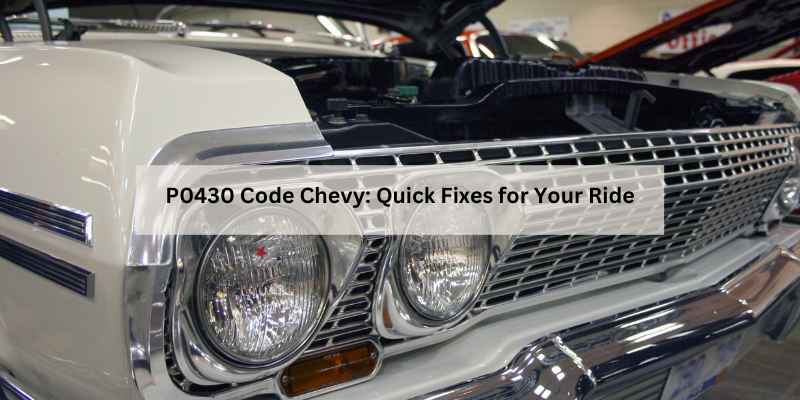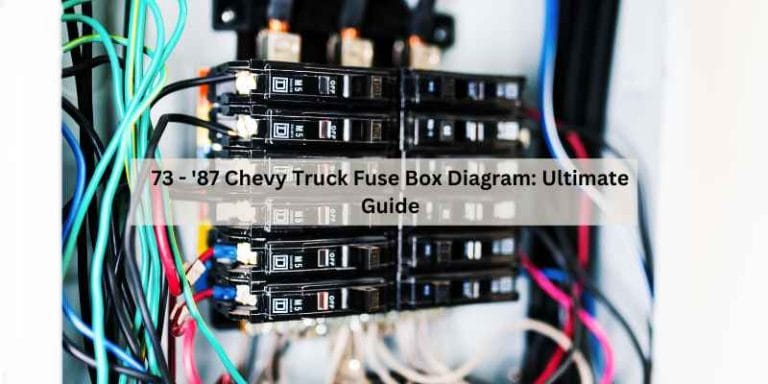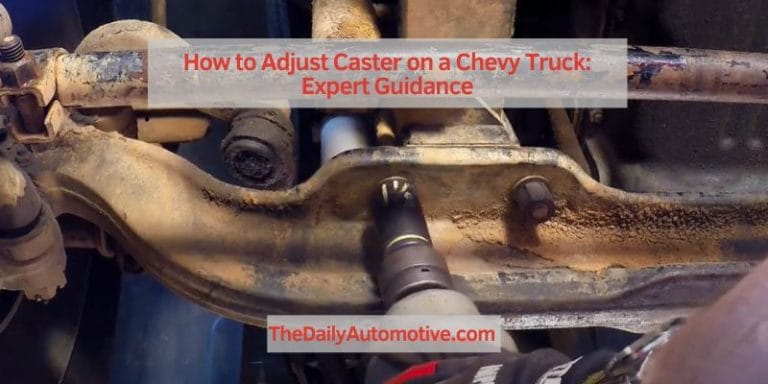P0430 Code Chevy: Quick Fixes for Your Ride
The P0430 code for Chevy indicates that the catalytic converter’s efficiency is below the required threshold. This issue can stem from a malfunctioning catalytic converter, faulty oxygen sensors, or exhaust leaks.
Understanding the P0430 code is crucial for any Chevy owner. This diagnostic trouble code signals potential problems with the vehicle’s catalytic converter. The catalytic converter plays a vital role in reducing harmful emissions and ensuring your engine runs efficiently. When this code appears, it often indicates that the converter isn’t functioning as intended, leading to increased emissions and potential engine performance issues.
Ignoring this code can result in more severe problems, including decreased fuel efficiency and engine damage. Addressing the P0430 code promptly helps maintain your vehicle’s health and compliance with environmental regulations.
Introduction To P0430 Code In Chevy Vehicles
The P0430 code indicates a problem with the catalytic converter in Chevy vehicles. This code suggests that the converter is not functioning as expected. It may not clean the exhaust effectively, causing increased emissions.
Common symptoms of the P0430 code include:
- Check Engine Light turning on
- Reduced engine performance
- Decreased fuel efficiency
- Strange odors from the exhaust
Diagnosing this issue involves checking the oxygen sensors and inspecting for any exhaust leaks. Addressing these problems early can help avoid costly repairs.
Root Causes Of P0430 Code
The P0430 code indicates issues with the catalytic converter. A faulty catalytic converter can lead to poor exhaust emissions. This component needs to effectively convert harmful gases. If it fails, it may not meet the vehicle’s performance standards.
Oxygen sensor issues can also trigger this code. These sensors monitor the air-fuel mixture. If they malfunction, they send incorrect data to the engine control unit. This can cause the engine to run poorly.
Exhaust leaks are another common cause. Leaks can allow unfiltered gases to escape. This affects the catalytic converter’s ability to do its job. Fixing these leaks is crucial for proper vehicle function.
Diagnosing The P0430 Code
To diagnose the P0430 code in a Chevy, specific tools are necessary. Use a OBD-II scanner to read trouble codes. A digital multimeter helps test sensor voltages accurately. Having a mechanical gauge can check exhaust pressure.
Gather these tools:
- OBD-II Scanner
- Digital Multimeter
- Mechanical Gauge
- Basic Hand Tools
Follow these steps for diagnosis:
- Connect the OBD-II scanner to the vehicle.
- Check and record the trouble codes.
- Inspect the catalytic converter for damage.
- Test the oxygen sensors for proper function.
- Examine for any exhaust leaks.
Quick Fixes For P0430 Code
Replacing the catalytic converter is a common solution for the P0430 code. It helps ensure your vehicle meets emissions standards. A faulty converter can lead to poor engine performance.
Another effective method is oxygen sensor replacement. Sensors detect the exhaust gases accurately. Replacing a malfunctioning sensor can restore proper readings.
Sealing exhaust leaks is also essential. Leaks can cause incorrect readings from the oxygen sensors. Check all joints and connections to ensure a tight seal.
Preventive Measures
Regular maintenance is key to avoiding the P0430 code in your Chevy. Check engine oil levels frequently. Replace the oil and filter every 3,000 to 5,000 miles. Inspect spark plugs and wires for wear. Change them as needed to ensure proper engine function.
Monitor the exhaust system for leaks. Address any leaks promptly to avoid further issues. Clean the fuel injectors regularly to maintain efficiency. Use high-quality fuel to reduce carbon buildup.
Early detection can save time and money. Listen for unusual noises from the engine. Watch for warning lights on the dashboard. Pay attention to changes in fuel efficiency. These signs can help catch problems early.
Understanding Repair Costs
The P0430 code indicates a problem with the catalytic converter in your Chevy. Repair costs can vary significantly based on the method chosen. Here’s a quick breakdown:
| Type of Repair | Estimated Cost |
|---|---|
| DIY Repair | $50 – $150 |
| Professional Repair | $200 – $1,500 |
DIY repairs are often more affordable. They require basic tools and some mechanical knowledge. Professional repairs offer expertise but come at a higher cost. Consider your skills and budget when deciding.
Driving With P0430 Code
Driving with a P0430 code can pose serious risks. This code indicates a problem with the catalytic converter. Ignoring it may lead to further vehicle damage. The engine may run poorly, resulting in decreased performance.
Potential risks include:
- Increased emissions that may harm the environment.
- Lower fuel efficiency, leading to higher gas expenses.
- Engine damage over time, causing costly repairs.
Stopping driving is essential if:
- You notice any strange noises.
- The check engine light stays on.
- The engine runs rough or stalls frequently.
Professional Insights
Professional help is essential when dealing with the P0430 code in your Chevy. This code indicates a problem with the catalytic converter. It may not meet the performance standards set by the vehicle’s computer.
Common symptoms include poor fuel efficiency and increased emissions. If you notice these signs, it’s crucial to consult a professional. A trained mechanic can diagnose the issue accurately.
Ignoring the P0430 code can lead to more serious problems. If the catalytic converter fails, it may require costly replacements. Regular checks can help maintain your vehicle’s health.
Seek professional assistance if:
- You experience check engine light warnings.
- Your vehicle shows signs of poor performance.
- There are unusual smells or noises while driving.
Frequently Asked Questions
Can Bad Spark Plugs Cause A P0430 Code?
Bad spark plugs can contribute to a P0430 code. They may cause misfires, leading to incomplete combustion. This affects the catalytic converter’s efficiency. Regular maintenance of spark plugs helps prevent such issues. Always diagnose the root cause for accurate repairs.
How Much Does It Cost To Fix A P0430 Chevy?
Fixing a P0430 code on a Chevy typically costs between $100 and $1,500. The price varies based on the issue, such as faulty oxygen sensors or a catalytic converter replacement. Always consult a mechanic for an accurate estimate tailored to your vehicle’s specific needs.
Will Catalytic Converter Cleaner Fix P0430?
Catalytic converter cleaner may help improve performance but won’t guarantee a fix for P0430. This code often indicates a failing catalytic converter or oxygen sensor issues. It’s best to conduct a thorough inspection and consider replacing faulty components for a reliable solution.
What Does The P0430 Code Mean For Chevy?
The P0430 code indicates an issue with the catalytic converter’s efficiency. It suggests that the converter is not functioning as expected, leading to increased emissions. This code is crucial for maintaining vehicle performance and compliance with emission standards.
Conclusion
Addressing the P0430 code in your Chevy is crucial for optimal performance. Ignoring it can lead to increased emissions and potential engine damage. Regular maintenance and timely repairs can save you money in the long run. Stay proactive to ensure your vehicle runs smoothly and efficiently.
Your Chevy deserves the best care!







